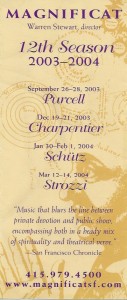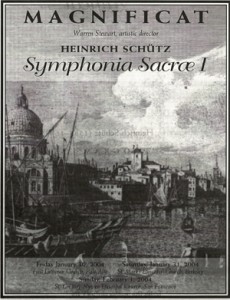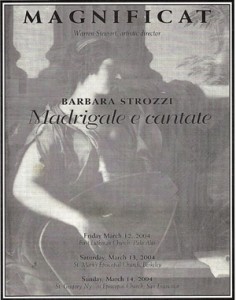2003-2004 – Magnificat’s 12th Season
 Magnificat’s Twelfth Season focused on lesser known works by three of the giants of the 17th Century, Henry Purcell, Marc-Antoine Charpentier, and Heinrich Schütz and a program devoted to one of the century’s most extraordinary female musicians, Barbara Strozzi.
Magnificat’s Twelfth Season focused on lesser known works by three of the giants of the 17th Century, Henry Purcell, Marc-Antoine Charpentier, and Heinrich Schütz and a program devoted to one of the century’s most extraordinary female musicians, Barbara Strozzi.
The season opened in September with “The Muse’s Feast” a program of songs and sonatas by Purcell that featured soprano Catherine Webster. Highlights included the songs Cupid, the slyest rogue around, from Playford’s 1685 Theatre of Music, the Evening Hymn from Harmonia Sacra and the beautiful ground bass aria O Solitude, though it would be difficult to pick a favorite from this program. Rebekkah Ahrendt, writing in the San Francisco Classical Voice praised Webster’s rendition of the Marian motet Tell Me, Some Pitying Angel noting her “command of emotion was superb, expressing the whole gamut of feelings a distressed mother might experience.” The program also included two trio sonatas and works for theorbo and harpsichord.
In December, Magnifcat turned to the music of Marc-Antoine Charpentier in a two-part program. The first half included Charpentier’s settings of the seven so-called “O” antiphons. The name comes from the fact that in the Roman breviary the Magnificat antiphons in vespers for the seven days preceding Christmas each begin with the acclamation “O”. We took up the composer’s suggestion of prefacing each of the antiphons with one of his noël seeitngs, by quite familiar to Magnificat’s audience from our productions of the Nativity Pastorale. The second half was devoted to the Dialogus inter angelos et pastores Judæ, one of at least six settings of the Christmas narrative by Charpentier. Packed with rich harmonies and a variety of textures and emotions the Dialogus is a particularly fine example of Charpentier’s mastery of dramatic narrative. Magnificat would present the work again in December 2010.
 In January 2004, Magnificat presented selections from Heinrich Schütz’s first volume of Symphoniæ Sacræ, a collection that we will re-visit in our upcoming season next January. For these concerts we were joined by two friends from the early wind ensemble The Whole Noyse (who will also join us again next season): Steve Escher and Richard Van Hessel. In April of 1628, Schütz applied to his employer, Elector Johann Georg I of Saxony, for permission to travel to Venice “not out of any frivolous desire to disport myself there for my own employment, but, it is to be hoped, to receive a better spirit.” He was granted permission and spent almost a year in the most Serene Republic where he encountered a musical culture vastly changed from when he had studied with Gabrieli some twenty years before. The “fresh devices” that he heard in Venice figure prominently in the Symphoniæ Sacræ, published while he was in Venice, particularly in varied instrumentation and vocal groupings.
In January 2004, Magnificat presented selections from Heinrich Schütz’s first volume of Symphoniæ Sacræ, a collection that we will re-visit in our upcoming season next January. For these concerts we were joined by two friends from the early wind ensemble The Whole Noyse (who will also join us again next season): Steve Escher and Richard Van Hessel. In April of 1628, Schütz applied to his employer, Elector Johann Georg I of Saxony, for permission to travel to Venice “not out of any frivolous desire to disport myself there for my own employment, but, it is to be hoped, to receive a better spirit.” He was granted permission and spent almost a year in the most Serene Republic where he encountered a musical culture vastly changed from when he had studied with Gabrieli some twenty years before. The “fresh devices” that he heard in Venice figure prominently in the Symphoniæ Sacræ, published while he was in Venice, particularly in varied instrumentation and vocal groupings.
The concerts were extremely successful and prompted a program two years later that featured selections from Schütz second volume of Symphoniæ Sacræ. Writing in the San Francisco Chronicle, Joshua Kosman observed that “to hear the music performed as brilliantly as it was on Saturday, under the leadership of artistic director Warren Stewart, was to marvel all over again at Schütz’s melodic fecundity, his mastery of counterpoint and formal proportions, and especially his distinctive blend of sensuality and sincere religious fervor, unmatched by anyone but Messiaen.” Writing for SFCV.org, Bruce Lamott praised the program as ” a model of artistic programming; rather than slavishly adhering to the order of publication, Stewart artfully assembled over half of the twenty symphoniae into a variegated program that showed both performers and composers in the best possible light.”
 For the final program of the season, Magnificat continued its exploration of music by women from the 17th Century, devoting a program to the music of Barbara Strozzi. The adopted daughter of poet Giulio Strozzi, Strozzi had the good fortune to be born into a world of creativity, intellectual ferment, and artistic freedom. She made a mark as composer and singer, eventually publishing eight collections of songs – more music in print during her lifetime than even the most famous composers of her day – without the support of the Church or the patronage of a noble house.
For the final program of the season, Magnificat continued its exploration of music by women from the 17th Century, devoting a program to the music of Barbara Strozzi. The adopted daughter of poet Giulio Strozzi, Strozzi had the good fortune to be born into a world of creativity, intellectual ferment, and artistic freedom. She made a mark as composer and singer, eventually publishing eight collections of songs – more music in print during her lifetime than even the most famous composers of her day – without the support of the Church or the patronage of a noble house.
Strozzi is perhaps best known for her solo cantatas, which no doubt reflect her own repertoire as a virtuoso singer of the highest caliber and several of these cantatas were included in Magnificat’s program. Less well-known are the ensemble madrigals, eleven of which Magnificat were included on the program.
Over the course of the season, artistic director Warren Stewart led ensembles that included Meg Bragle, Louise Carslake, Daria D’Andrea, Hugh Davies, Jolianne von Einem, Jennifer Ellis, Steve Escher, Cynthia Freivogel, Richard Van Hessel, Dan Hutchings, Byron Rakitzis, Rob Diggins, Katherine Heater, Hanneke van Proosdij, David Tayler, Catherine Webster, Scott Whitaker, and David Wilson.